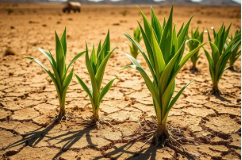
Farmers across the United Kingdom are grappling with one of the driest seasons in recent years, as prolonged hot and rainless weather takes a heavy toll on agriculture. The lack of rainfall, combined with rising temperatures, has left fields parched, threatening both crop yields and livestock grazing.
Reports from farming communities indicate that grass growth has slowed dramatically, forcing livestock producers to dip into winter feed supplies much earlier than usual. Arable farmers are also facing declining yields in staple crops such as wheat, barley, and oilseed rape, with many fearing significant financial losses if dry conditions persist.
Agricultural groups describe the situation as “devastatingly dry,” highlighting the stress on rural economies and food production. Some farmers have already begun to reduce herd sizes to cope with the shortage of fodder and water.
The National Farmers’ Union (NFU) has called for urgent government support, including measures to assist with feed costs, water supply, and longer-term investments in drought resilience. Meanwhile, environmental experts are urging greater adoption of sustainable practices such as rainwater harvesting, soil-moisture retention methods, and crop diversification to protect against future climate extremes.
While forecasts suggest some relief in the form of scattered showers, farmers stress that consistent rainfall is essential to restore soil moisture levels and avert long-term damage. The current crisis, they warn, is a stark reminder of the increasing challenges posed by climate change to UK agriculture.Farmers across the United Kingdom are grappling with one of the driest seasons in recent years, as prolonged hot and rainless weather takes a heavy toll on agriculture. The lack of rainfall, combined with rising temperatures, has left fields parched, threatening both crop yields and livestock grazing.
Reports from farming communities indicate that grass growth has slowed dramatically, forcing livestock producers to dip into winter feed supplies much earlier than usual. Arable farmers are also facing declining yields in staple crops such as wheat, barley, and oilseed rape, with many fearing significant financial losses if dry conditions persist.
Agricultural groups describe the situation as “devastatingly dry,” highlighting the stress on rural economies and food production. Some farmers have already begun to reduce herd sizes to cope with the shortage of fodder and water.
The National Farmers’ Union (NFU) has called for urgent government support, including measures to assist with feed costs, water supply, and longer-term investments in drought resilience. Meanwhile, environmental experts are urging greater adoption of sustainable practices such as rainwater harvesting, soil-moisture retention methods, and crop diversification to protect against future climate extremes.
While forecasts suggest some relief in the form of scattered showers, farmers stress that consistent rainfall is essential to restore soil moisture levels and avert long-term damage. The current crisis, they warn, is a stark reminder of the increasing challenges posed by climate change to UK agriculture.


















